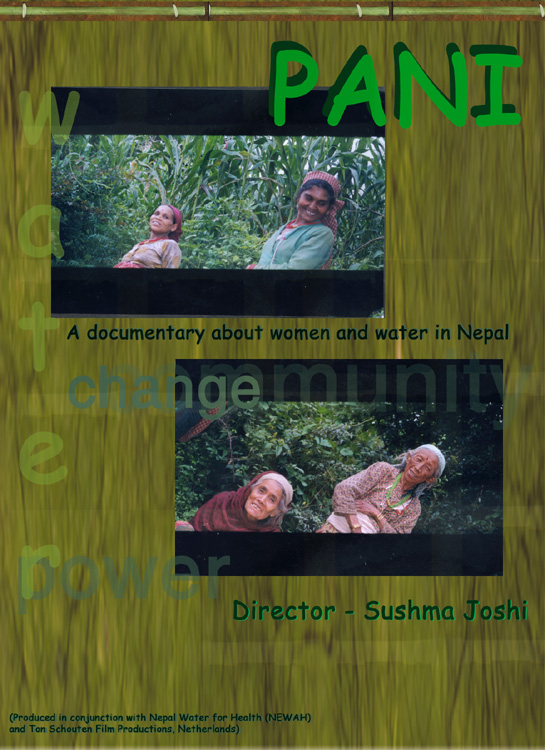|
PANI
(Download poster at the bottom.)
(Produced in conjunction with IRC and Nepal Water for Health,
and Ton Schouten Film Company, Netherlands)
Featured on CNN International's Q and A with Riz Khan
PANI (Water), is a 28 minute video about Lele, a village outside of Kathmandu. The inhabitants of this community tell the history of how they installed and set up a committee to manage their own drinking water system. The narrative moves from a fairly uncomplicated story told by the leaders about the initial history of installation to the complexities of gender and caste relations as the story progresses.
As the video follows the meetings, women, who are the main users of water, voice their exclusion in the management process of the upper caste, Chettri dominated water committee. This is contrasted with an interview with the leader of the Tamang women's microcredit group, where the decisions are made exclusively by women. She recounts the success of the group, which is in stark contrast to the quarrels of the water committee.
The maintenance fund, which has been proposed as a solution for sustaining the water system by the non-governmental organization from Kathmandu, becomes the locus of conflict. The leadership is not transparent or accountable to the group. People stop paying their monthly fees because they are not sure where their money is going, and also because they believe that the Rs.1000 provided by the commercial mineral water factory which is tapping water from their spring is enough for the fund. This dissolves the fund as people stop paying and passively stop participating in the development process.
We see the fault-lines of caste as the village's powerful political leader reveals his prejudices in the process of voicing a liberal, no discrimination party line. This is juxtaposed with the views of an older woman from a lower caste who ultimately reveals the ambiguity of notions of joint ownership and "community" in a society deeply fractured by gender and caste power relations.
This video allows the contradictions and conflicts that come up in any organized effort to create social change to emerge. By giving voice to the noise and frustrating lack of coherence, it allows a deeper look into the exclusions of development. Ultimately, it looks at the process of alternative, small-scale modes of development, which are becoming more popular, and questions whether its promise can be realized if traditionally discriminatory systems, encoded in axes of power of gender and caste, are not fully addressed.
Chettri: Hindu group higher on the caste hierarchy, in which gender is more segregated.
Tamangs: Ethnic group with animistic traditions, lower on the Hindu caste hierarchy. Women have more privileges within this group.
|
|
|
DISTRIBUTION
This video has been used as a training video for 700 different communities inside Nepal. People working in the water sector have used it to generate discussions about gender and caste in community management.
This video has been shown outside Nepal, in venues like:
Q and A with Riz Khan, CNN International
Flickerfest Film Festival, Sydney, Australia
Watercourses Conference, Middlesex University, England
The Southern Asia Institute, Columbia University
The School for Oriental and African Studies, London
The Graduate Center, CUNY, NY
The International House, New York
|
